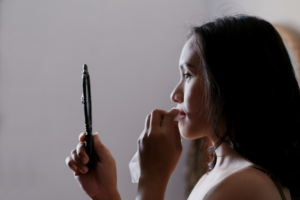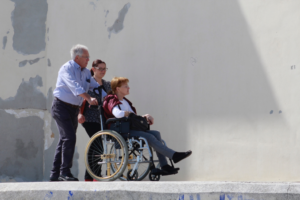Out of Oxygen
By Mercedes Aguirre, SPT
Congratulations to Rutgers University Doctor of Physical Therapy Program graduate student Mercedes Aguirre, a finalist in the physical therapy student essay contest co-sponsored by the ACAPT Consortium for the Humanities, Ethics, and Professionalism (CHEP) and JHR! This writing competition is designed to encourage deep thinking by students about the role and value of humanities, ethics, and professionalism in academic training and professional life. The second in an annual series, the CHEP-JHR essay contest offers a creative opportunity to ignite critical reflection in PT students across the nation, to support holistic approaches to patient care. This year’s prompt addressed the often perplexing and difficult situations in clinical care where we are pressed to make value judgments of what is right or wrong, or good or bad. Students were asked to write about a clinical situation or experience that contained an ethical issue that was unsettling, or may have resulted in making an ethical judgment, detailing their thoughts, feelings, and responses. In her essay, “Out of Oxygen,” Ms. Aguirre describes an incident during her first clinical experience that taught her the importance of taking a deep breath—and speaking up on behalf of one’s patient.
Walking through the hospital’s wide corridor, whose glass walls brought the light in from outside, I heard squeaking sneakers hurriedly moving toward the elevators and staircases, and rolling transport beds that carried patients from floor to floor. As I walked along the right side of the hallway, I saw a small birdbath outside the window. I could feel the sun’s rays as I walked closer to the glass; the birds seemed content and cool while spreading their delicate wings and showering themselves with droplets of rainwater.
My clinical instructor (CI) and I made our way to the end of the corridor and walked into the elevator. “You and I both know that we are way behind schedule. We have to move a bit quicker today, okay?”
“Yes, I understand,” I replied. I was three weeks into my first clinical experience as a second-year Rutgers North DPT student and struggling to work efficiently. Having to consult with nurses and other health professionals before seeing patients took time; moreover, patients’ conditions were always changing and I had trouble thinking quickly on my feet. My CI said that was all part of the process. Still, I knew her frustration would grow, as it usually does after lunch when the clock seems to tick faster.
“We have eight patients left on our schedule and we need time to write up all the notes. Go and see the patient in room 230B first and I will be there before you get them up,” my CI said as she walked out of the elevator and toward another room.
Mrs. O’s Oxygen
As I walked into room 230B, I greeted Mrs. O, who had a nasal cannula in place with her oxygen flow set to 2.0 L. Fortunately, in my cardiopulmonary class, we were told many times that we cannot take oxygen away from patients unless the physician has stated differently in the note. I felt confident because I was prepared for this situation and I knew how to keep the patient safe. After taking Mrs. O’s vitals and checking her oxygen saturation, my fleeting moment of confidence came to a sudden halt when my CI walked into the patient’s room.
“Mrs. O! How are you doing today?” my CI said as she took off the patient’s nasal cannula. “Let’s get you up and moving!”
I was stunned. I suddenly felt my throat closing, unable to speak because I didn’t want to further irritate my CI. My hands tightly gripped my notepad, which I had used that morning to write down the amount of oxygen Mrs. O’s physician prescribed for her. As an individual who struggles with confidence, I found it difficult to speak up, but I couldn’t hide behind a wall of ignorance.
“Mercedes,” my CI waved at me, “Let’s get moving, please.” She gave a smile that I knew meant she was getting impatient.
I turned toward Mrs. O, who was sitting on the edge of the bed with the oxygen tubing laying next to her, her grey eyes tiredly looked at my CI. Mrs. O was slowly running out of oxygen and with every rise and fall of her chest, I feared that she would not be able to handle ambulating outside of her room without an oxygen tank.
“Um,” I began, “I read on the chart this morning that the doctor said the patient has to be on oxygen at all times.”
“Well, sometimes, the patients don’t really need it,” my CI placed her hands back on the patient to help her get up; however, before I could say anything else, she took a deep sigh and relented: “But if you want to use the oxygen tank, that is your decision. Might have a hard time finding it, though.”
I quickly placed back the nasal cannula on Mrs. O, took her oxygen saturation, and walked toward the utility room to get an oxygen tank. After looking for a tank that was full enough to use, I walked back to the room, attached the tank—and Mrs. O was able to ambulate safely.
Taking a Breath
Once we were able to treat all of the patients on our list, my CI and I slowly walked back through the sunlit corridor toward the rehab office. She paused to look at the small birds bathing in the heat. “I love looking at them. A lot of sadness can happen in this hospital, but those birds always look so happy.”
“They are always a pleasant sight to see,” I replied. I took a deep breath. “Sorry that I take too long sometimes. Next time, I will get the oxygen tank prior to seeing the patient.”
“Sounds good!” my CI laughed. “I appreciate your focus on safety. Sorry for being so impatient this afternoon. Now go finish your notes!”
Courage to Put the Patient First
This was not the only time that I doubted my abilities and took a long time to make simple decisions for fear that I may be wrong. Although sometimes clinicians have the liberty to take a few moments to think about a situation, they often have to make decisions in a matter of seconds; that was difficult for me to do in some cases.
Moreover, it can be easy for a student to think of their clinical experience as a test that they are being graded on, and to be scared to share their opinion. However, most of the time the solutions that a student comes up with are not inherently wrong. They may only need some tweaking.
As the start of my second clinical experience nears, I know that I need to trust my education and my own abilities to put the patient first.








 Member since 2019 | JM14274
Member since 2019 | JM14274


NO COMMENT